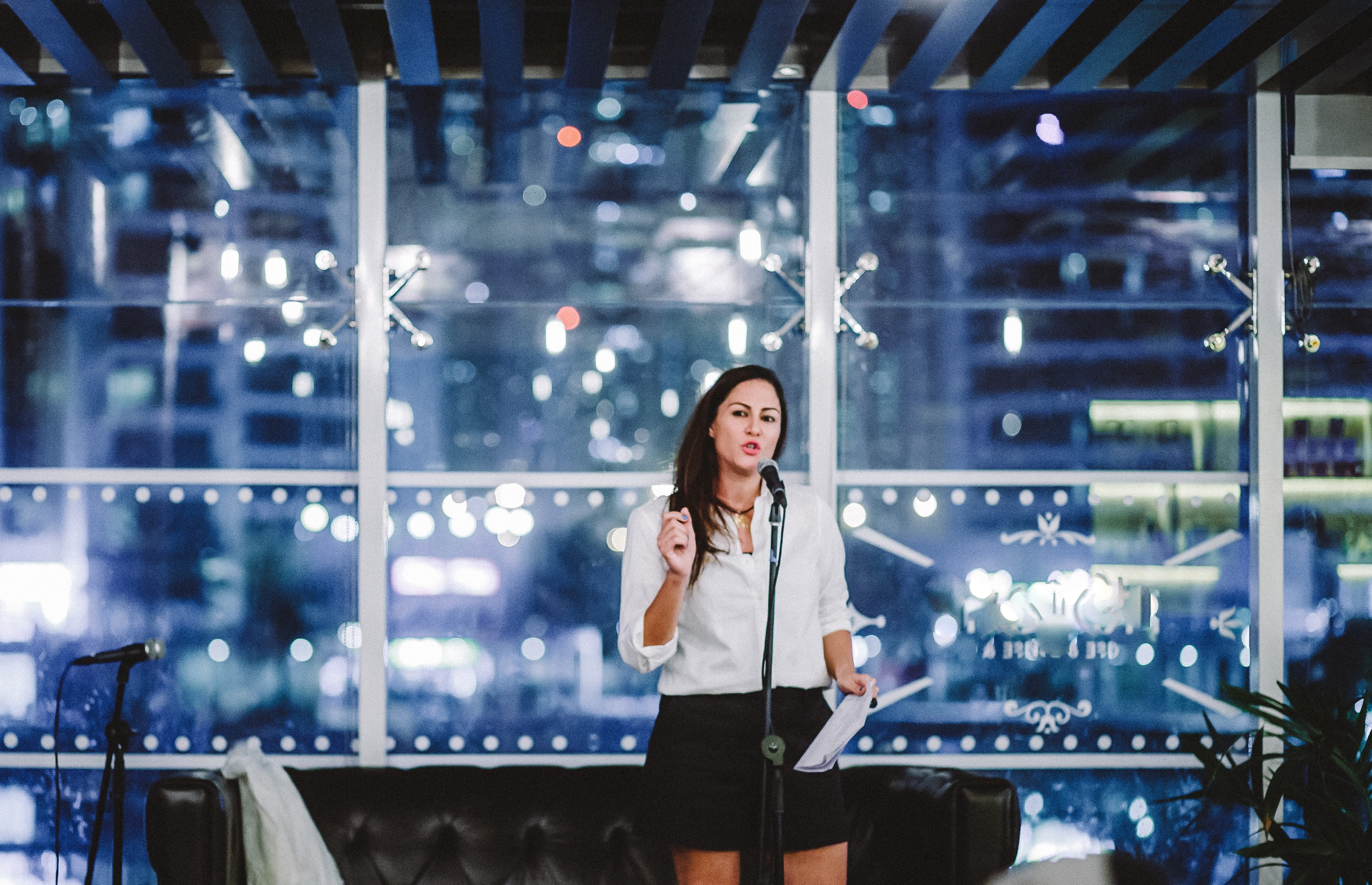There was and how much there was.
Women gather in this living room.
They empty and fill the coffee cups.
I count the flowers on the curtains
when we—I get bored.
Try oil. I like the glide
of our bodies in the night.
My friend’s mother showed her
a video about it, the week before
she got married. I was still single,
and I asked. No one would tell.
The women laugh.
The walls don’t have ears here.
Everybody is a woman here.
Some women bleed. Some don’t.
Did you?
Every woman bleeds
one way or another.
I wear less clothes, less
hair on my body, and still
he doesn’t. Where can I find
the sugar?
There was and how much there was.
All the women here love chocolate.
My first husband, he wanted me
to hide my arms, my legs, my laughter.
I told myself love means to change—
bullshit. I knew how much he loved
his money, so I flung his wallet
from the balcony. It opened its leather
wings and fell flat unto the street.
I told him I did it
because I hate long skirts.
I made sure my second husband
likes to drink and dance and carry me
on his shoulders in the middle of the club.
The woman in the blue dress starts singing.
The others clap, sway
their heads, their shoulders.
Ya salaam, Allah, Allah.
When I was a little girl, my mother
told me I was beautiful, but not as much
as her. I took her kohl pencil and drew
a mole on my left cheek. All I wanted
were lips, eyes, hair, hips, a smile
like Hind Rostom.
The women sigh.
Ah, Hind Rostom.
They have all seen La Anam.
I heard she refused a million
gineih offer to turn her life
into a drama series.
Oh what I wouldn’t give.
Some bitch at the gym today
walks in, stands in front of me,
talks to my husband. Size 36 women
get away with everything.
Hind Rostom wasn’t a size 36.
I shouldn’t, really,
but pass the chocolate.
There was and how much there was.
One woman switches on the TV.
It’s time for her Arabic-translated
Mexican show. Last episode.
Antonio is about to kill his brother
and marry Rachel.
Have you heard about Marwa?
Her husband took a second wife.
She stays silent because of the money.
The other day, I asked the sheikh
about Aisha, the prophet’s wife.
I said, “Is it true she was often jealous
and once told him this God of his
only brings down ayahs convenient?”
One woman says she read that
somewhere. Or heard it.
Says marriage will make you say
strange things. Faith too.
The sheikh spent half an hour telling me
a story about honey and the Prophet’s wives.
I forget what it was. When I kept asking,
he reminded me it was the rasool
we were talking about. I said, “But
wasn’t he mortal?
And if he bathed too long
wouldn’t the tips of his fingers
have shriveled up, like ours would?”
The women agree but advise her
to ask for forgiveness, nevertheless.
استغفر الله
Antonio has killed his brother.
Gun still in hand, he kisses Rachel.
The women change the channel.
There’s an old Egyptian play.
Oh keep that one. It cracks me up.
This is Raya, this is Sakina.
They are sisters who kill
women and steal their jewelry.
In the end, one kills her daughter
without knowing it. Once she knows,
the play turns tragic. My favorite kind.
You laugh so much and in the end
you cry and think where
did this come from.
There was and how much there was.
One woman says she always cries
when she watches a movie on the airplane.
It’s so embarrassing but yes,
every single time. Like when Diane Lane
cheated on Richard Gere and I’m thinking,
why am I crying? What’s that got to do
with me?
The women pass the nuts, the cheese.
Some drink orange juice, some wine.
My fifteen-year-old son lectured me
about the wine the other day.
He said it was haram.
He asked why I’ve not gone
to Mecca with his father last year.
I said, “You know what
Allah says? He says,
Respect your mother.”
I told him, “YOU came out
of ME. Shut up.” I told him
all religion is metaphor.
He asked what’s metaphor.
The women’s laughter is louder.
One woman says no man
understands metaphor.
Pass me that bottle, I need
another drink. Sometimes I feel
I should’ve aimed better
when I flung my slipper at him
when he was a child. Should’ve
hit that head of his, knocked
the stupid out of it.
There was and how much there was.
The woman with the black fringe
knows how to read the coffee cups.
The women say, “Please, please.”
I see a big white fish. It means
money. I see a narrow wavy road.
It means sickness, or perhaps
bad news. This is the head of a bird
here, its small beak. Perhaps you
have a burden; it will be lifted,
inshallah. Children are good,
snakes are bad. You will travel.
Lick your thumb and press it
against the bottom of the cup.
I hope your print is white
like the sun. But don’t listen
to me. This is just for fun.
Allah says fortune tellers lie,
even when they tell the truth.
The women light their cigarettes.
The men are playing cards somewhere,
the children are sleeping.
Last week, at the mall,
I was peeing and I heard
a woman tell her friend
her hair was falling out.
I started crying. My hair,
it’s falling out too. I keep
a picture in my bag
of my graduation night.
Look, look how pretty
I was, how tiny my waist.
The women look. They tell her
she is beautiful. Her daughter
looks just like her, smallah.
My daughter fights with me
all the time. Nothing I do
makes her happy.
The other day I told her,
“You cow.” I felt bad
five minutes later,
made myself some coffee.
I try to tell my husband,
but he blames me.
I prefer to mumble it all
to the kettle as it boils.
The women nod.
They yawn, they stretch.
Look how late it’s getting.
This talking never ends.
We better leave before
your husband comes back home.
See you next week.
There was and how much there was.
Before they leave, the women
wrap the leftover cake
with aluminum foil.
They throw out the cigarettes, the ash.
They collect the empty glasses.
Notes:
“There was and how much there was” is a literal translation of كان يا ما كان, which is how traditional Arabic tales start. It is usually translated as “Once upon a time.”
Hind Rostom was a famous Egyptian actress, known as the Marilyn Monroe of Egypt. La Anam is the title of one of her movies, and it translates as “I Don’t Sleep.”
An ayah is a verse of the Qur’an.
استغفر الله translates as “God forgive.”

Zeina Hashem Beck is a Lebanese poet. Her first collection, To Live in Autumn, won the 2013 Backwaters Prize and was runner-up for the Julie Suk Award. She’s also the author of two chapbooks: 3arabi Song, winner of the 2016 Rattle Chapbook Prize (forthcoming in September 2016), and There Was and How Much There Was, to be published as a Laureate’s Choice by smith|doorstop in the UK. Her work has been nominated for the Pushcart Prize, Best of the Net, and the Forward Prize, and has appeared in Ploughshares, Poetry Northwest, and The Rialto, among others. She lives with her husband and two daughters in Dubai, where she has founded and runs PUNCH, a poetry and open mic collective. She has participated in literary festivals in the Middle East, the UK, and the US.



